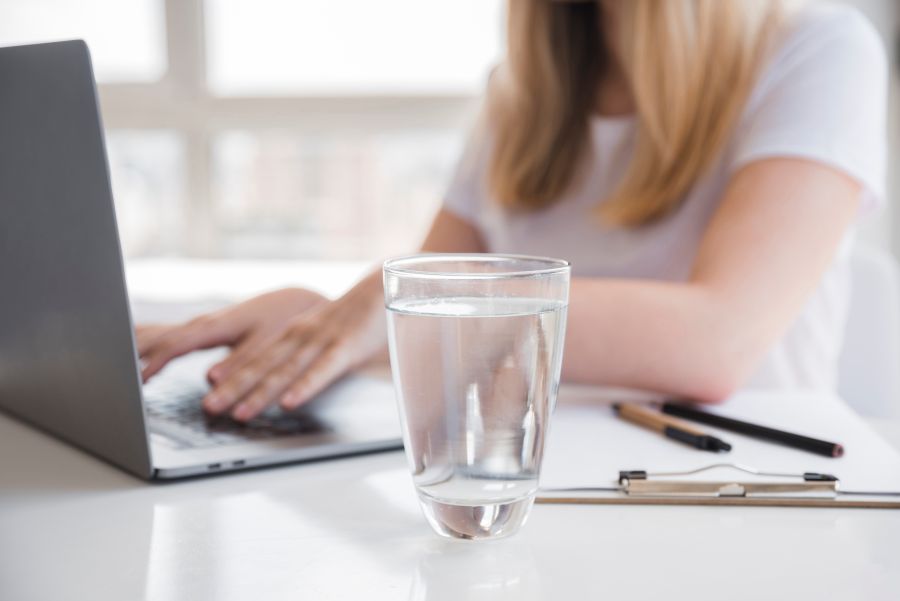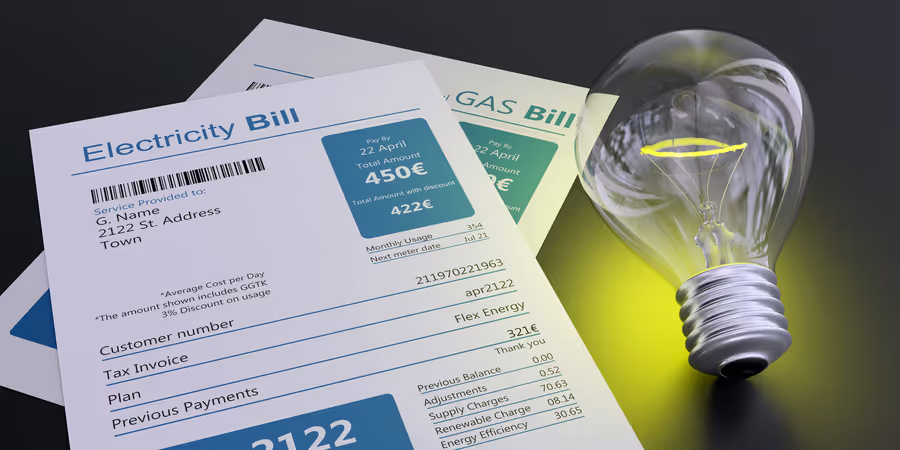When you’re running a business in the UK, it sometimes feels like VAT crops up on almost everything. Electricity, gas, software subscriptions, equipment, it all adds up. One of the questions we hear a lot at Crunch is: “is there VAT on water bills?”
The short answer is that households don’t pay VAT on water, but businesses sometimes do. Whether VAT appears on your bill depends on the type of business you run, how water is used in your day-to-day operations, and which services are being charged.
Water bills and VAT for households
Let’s start with the straightforward part. Households in the UK don’t pay VAT on water or sewerage. If you look at your home water bill, you’ll see charges for supply, wastewater removal, and surface water drainage, but no VAT line.
That’s because HMRC classes household use as “domestic supply”, which is VAT-exempt. However, the picture changes when water is supplied to a business.
What happens with business water bills?
For businesses, VAT on water bills isn’t a blanket rule. Some companies never see VAT on their water supply, while others are charged the full 20%. Most businesses will see VAT added to sewerage services, depending on their supplier
According to HMRC's VAT manual, most sewerage services are standard-rated at 20% for businesses. However, regional suppliers such as Dŵr Cymru/Welsh Water and Castle Water currently do not charge VAT on sewerage services. Practices can vary, so it’s always best to check directly with your supplier.
Whether your business pays VAT on the water supply depends on how the water is used:
- Domestic-style use: Staff kitchens, toilets, light cleaning. This is not taxable.
- Industrial use: Water is central to your service or production process. This is treated as an “industrial supply” and thus VAT is charged at 20%.
That’s why asking “is there VAT on water bills?” doesn’t have a single answer, it depends on the nature of your business.
{{tax-guide}}
Businesses that pay VAT on water
Certain industries are always charged VAT on water supply. Obvious industries like commercial car washes, launderettes, and textile dyeing companies are all examples of businesses that fall into this category.
Other industries that may pay VAT on water
VAT on water bills isn’t limited to the obvious examples given above. Other businesses that may be charged VAT on water supply include:
- Breweries and distilleries – water is a core ingredient in production.
- Tanneries and leather processors – extensive water use in processing.
- Agricultural and horticultural businesses – water used heavily for irrigation or production.
- Construction and demolition firms – water used directly for cleaning, dust suppression, or cooling.
Any business where water is central to the service or production process may be charged VAT on the supply. HMRC looks at how water is used, not the type of business, so even industries we haven’t listed could see VAT applied.
Do SIC codes affect VAT on water bills?
In short, yes. Water suppliers usually rely on your company’s SIC code (the classification you register with Companies House) to decide whether VAT should be added to your water supply.
For example, if your SIC code indicates you run a laundry, brewery, or car wash, VAT will normally be charged. If your SIC code is for professional services, retail, or hospitality, then water supply is typically exempt.
That means it’s worth double-checking that your SIC code is accurate and up to date — not just for VAT on water bills, but for other tax and regulatory reasons too. If you think you’re being charged incorrectly, your accountant (hello!) can review your bills and liaise with your supplier if required.
Real-world examples
To see how the rules work in practice, let’s look at a few different businesses:
- A design agency in Bristol – They use water in the staff kitchen and bathrooms, and for occasional cleaning. No VAT is charged on their water supply, but VAT does appear on sewerage services.
- A bakery in London – Water is needed for dough preparation and cleaning equipment. But food production isn’t automatically classed as “industrial” for VAT purposes, so there’s no VAT on the water supply. Sewerage charges, however, remain standard-rated.
- A commercial car wash in Birmingham – Here, water is the heart of the service being provided, so VAT is charged on both the water supply and sewerage.
Businesses that don’t pay VAT on water
Examples of businesses that typically don’t pay VAT on their water supply include:
- Shops and retail outlets
- Offices and co-working spaces
- Salons and personal care businesses
- Professional service firms such as accountants, lawyers, or consultants
That said, your bill won’t necessarily be completely VAT-free. Charges for wastewater, sewerage, and trade effluent are standard-rated, so VAT will still appear on those parts of your bill.
Reclaiming VAT on water bills
If your business is VAT-registered, you can usually reclaim any VAT charged on water bills as input tax through your VAT return. That includes sewerage and wastewater charges, and water supply where VAT is correctly applied.
It’s an area where we often see mistakes from our clients. Some businesses don’t include water VAT in their returns because they assume it can’t be reclaimed. Others have been misclassified by their supplier and charged VAT on water supply when they shouldn’t have been. In both cases, money is left on the table.
At Crunch, we help clients spot these issues all the time. Even small amounts of reclaimable VAT add up over a year.
What if you’re not VAT-registered?
For non-VAT-registered businesses, any VAT charged simply becomes part of your overheads. A small launderette or car wash under the threshold, for example, still has to pay VAT on its water bills but can’t reclaim it.
In some cases, the cost of VAT-heavy overheads like utilities is one of the factors pushing a business to consider VAT registration, especially if they’re already close to the threshold.
{{ltd-guide}}
Why HMRC treats water differently
It might feel inconsistent that some businesses pay VAT on water and others don’t. But HMRC’s reasoning is that “domestic-style” water use is a basic necessity and shouldn’t be taxed. “Industrial” water use, on the other hand, is seen as a raw material or input, and therefore falls under normal VAT rules.
That’s why suppliers often ask what type of business you are when you first set up an account. It helps them classify your usage correctly and decide whether VAT should apply.
FAQs on VAT and water bills
Only have five minutes? Here’s the information in helpful FAQs.
1. Is there VAT on water bills in the UK?
Households don’t pay VAT on water supply. Most businesses don’t either, but HMRC generally classifies sewerage services as standard-rated. That said, some suppliers, including Dŵr Cymru/Welsh Water and Castle Water, currently don’t charge VAT on sewerage, so practices can vary. Only certain industries, such as car washes and launderettes, pay VAT on the supply of water.
2. Can I reclaim VAT on water bills?
If you’re VAT-registered, yes. You can reclaim VAT on sewerage charges, and on water supply if your business falls into one of the industries where VAT applies. If you’re not VAT-registered, VAT is simply part of your costs.
3. Why do some businesses pay VAT on water while others don’t?
HMRC treats “domestic-style” water use like offices and shops as exempt. But when water is an industrial input, such as for a car wash, brewery, or laundry, it’s standard-rated at 20%.
4. What is the key takeaway regarding businesses and paying VAT on water bills?
Most businesses don’t pay VAT on water supply, but they do on sewerage. The exceptions are industries where water is central to the service, in which case VAT is charged at 20%.
What to do if you’re unsure
If you’re scratching your head over your bill, start by looking at the VAT line. If VAT is being charged, it should be shown clearly. If you don’t think your business falls into an industrial category, it’s worth checking with your supplier.
And if you’re VAT-registered, don’t forget to include any VAT you do pay on water or sewerage in your VAT return. It’s an easy one to overlook, but as we tell our clients at Crunch, the small savings add up just as much as the big ones.
How Crunch can help
VAT on water and sewerage can be tricky, especially when supplier practices differ or your business has industrial water use. That’s where Crunch comes in.
We work with businesses of all sizes to:
- Review your bills and make sure you’re only paying what you should.
- Identify reclaimable VAT, so you don’t miss out on money that belongs to you.
- Provide clear, practical guidance, removing the guesswork from VAT and water charges.
With Crunch, you’re not just getting advice, you’re getting a team of accountants on your side. This means you’ll save time and protect your bottom line. Even small oversights in VAT can add up, so having expert support ensures your finances stay accurate and compliant.
So, is there VAT on water bills?
It depends on how your business uses water. Some industries pay VAT on supply, most don’t, and sewerage charges may vary depending on your supplier. If you’re unsure, our Crunch accountants can review your bills and confirm your VAT position.

.svg)



.webp)















